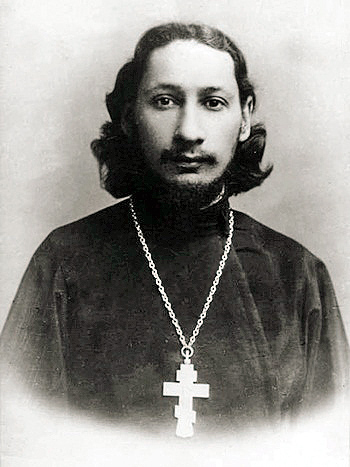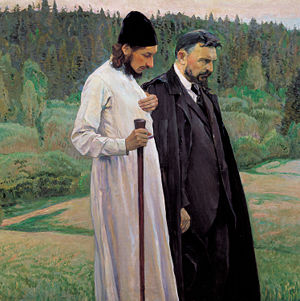Re: The Rise of the Russian Empire: Russo-Armenian Relations
A New Prime Minister, and More Intrigue, Arise in Russia

(Viktor A. Zubkov in the State Duma)
MOSCOW, Sept. 14 — Russia’s Parliament confirmed Viktor A. Zubkov as prime minister on Friday, cementing the instant rise to Kremlin stature of a quiet confidant of President Vladimir V. Putin even as Mr. Putin added fresh uncertainty to the question of who might succeed him. Speaking at an annual meeting of visiting Russia experts, Mr. Putin said there were now at least five viable presidential candidates for the election next spring. Three are known: Mr. Zubkov and the two first deputy prime ministers — Sergei B. Ivanov and Dmitri A. Medvedev. Mr. Putin declined to share the other two names. “Currently a minimum of five people can be named who stand a real chance of running for president and getting elected,” Mr. Putin said.
He added, “There is a real choice.”
The surprise ascension of Mr. Zubkov, who previously led a small federal agency that investigates financial crimes, had raised questions about the field. Mr. Putin’s hint of two more candidates appeared to confuse the succession question further, leaving Kremlin watchers speculating anew about his plans. The group of Russia experts Mr. Putin addressed, known as the Valdai Discussion Group, gathered this year at a presidential compound on a bluff overlooking the Black Sea. Mr. Putin’s remarks, and the immediate reaction in the Russian news media to the idea of five serious contenders for the presidency, underscored both his supremacy in domestic Russian affairs and the nature of the competition in Russian elections.
While any qualified candidate may seek public support to run for office, political analysts and the Kremlin’s spokesmen alike have said that any vote next year will almost certainly depend on an electorate of one: Mr. Putin. One senior Western diplomat, who spoke on condition of anonymity in accordance with diplomatic protocol, said Mr. Putin’s assertion that there are five solid presidential candidate was perhaps best viewed as misleading. “This is designed to make it look like there will be an election,” the diplomat said. “But in the end he is going to pick.”
In a sign that there could be further shake-ups, Mr. Putin also expressed dissatisfaction with the government that had been led until now by Prime Minister Mikhail Y. Fradkov. He said that members of the government had not been working as diligently as he expected, and that some of the ministers had begun to plan their lives after Mr. Putin’s expected departure next year. But he added that Mr. Fradkov made his own decision to resign Wednesday.
“I did not push the prime minister to do this,” Mr. Putin said. “The prime minister clearly saw the mood of his collective and came to me with the proposal. I had the same sense.”
As Mr. Putin addressed the meeting, Mr. Zubkov began work in the government, official Russian news agencies reported. At least a modest shake-up of ministers was expected. Mr. Zubkov, who will now manage the government in the months leading to the parliamentary elections in December, is a former collective farm manager who has been a confidant of Mr. Putin’s since at least the early 1990s when he served as Mr. Putin’s deputy in a mayoral department in St. Petersburg. In recent years he has led a federal agency that investigates money laundering and other crimes. Mr. Putin praised him, calling him “highly professional, decent, balanced and wise.”
“There is no corruption around him,” Mr. Putin said.
The Western diplomat said Mr. Zubkov had a good reputation for fighting international money laundering and for cooperating with investigators in the West in campaigns to undermine terrorist financing. Several analysts have suggested that Mr. Zubkov could become president and remain loyal to Mr. Putin, allowing Mr. Putin to return to office. Mr. Putin is barred by the Constitution from serving a third consecutive term, but would be eligible to run again in 2012, or sooner, if the next president serves an abbreviated term. He offered no clear insight to his intentions on Friday.
“I have not decided concretely what I will do,” he said, “but I will have an influence on events.”
Source: http://www.nytimes.com/2007/09/15/wo...tml?ref=europe
A New Prime Minister, and More Intrigue, Arise in Russia

(Viktor A. Zubkov in the State Duma)
MOSCOW, Sept. 14 — Russia’s Parliament confirmed Viktor A. Zubkov as prime minister on Friday, cementing the instant rise to Kremlin stature of a quiet confidant of President Vladimir V. Putin even as Mr. Putin added fresh uncertainty to the question of who might succeed him. Speaking at an annual meeting of visiting Russia experts, Mr. Putin said there were now at least five viable presidential candidates for the election next spring. Three are known: Mr. Zubkov and the two first deputy prime ministers — Sergei B. Ivanov and Dmitri A. Medvedev. Mr. Putin declined to share the other two names. “Currently a minimum of five people can be named who stand a real chance of running for president and getting elected,” Mr. Putin said.
He added, “There is a real choice.”
The surprise ascension of Mr. Zubkov, who previously led a small federal agency that investigates financial crimes, had raised questions about the field. Mr. Putin’s hint of two more candidates appeared to confuse the succession question further, leaving Kremlin watchers speculating anew about his plans. The group of Russia experts Mr. Putin addressed, known as the Valdai Discussion Group, gathered this year at a presidential compound on a bluff overlooking the Black Sea. Mr. Putin’s remarks, and the immediate reaction in the Russian news media to the idea of five serious contenders for the presidency, underscored both his supremacy in domestic Russian affairs and the nature of the competition in Russian elections.
While any qualified candidate may seek public support to run for office, political analysts and the Kremlin’s spokesmen alike have said that any vote next year will almost certainly depend on an electorate of one: Mr. Putin. One senior Western diplomat, who spoke on condition of anonymity in accordance with diplomatic protocol, said Mr. Putin’s assertion that there are five solid presidential candidate was perhaps best viewed as misleading. “This is designed to make it look like there will be an election,” the diplomat said. “But in the end he is going to pick.”
In a sign that there could be further shake-ups, Mr. Putin also expressed dissatisfaction with the government that had been led until now by Prime Minister Mikhail Y. Fradkov. He said that members of the government had not been working as diligently as he expected, and that some of the ministers had begun to plan their lives after Mr. Putin’s expected departure next year. But he added that Mr. Fradkov made his own decision to resign Wednesday.
“I did not push the prime minister to do this,” Mr. Putin said. “The prime minister clearly saw the mood of his collective and came to me with the proposal. I had the same sense.”
As Mr. Putin addressed the meeting, Mr. Zubkov began work in the government, official Russian news agencies reported. At least a modest shake-up of ministers was expected. Mr. Zubkov, who will now manage the government in the months leading to the parliamentary elections in December, is a former collective farm manager who has been a confidant of Mr. Putin’s since at least the early 1990s when he served as Mr. Putin’s deputy in a mayoral department in St. Petersburg. In recent years he has led a federal agency that investigates money laundering and other crimes. Mr. Putin praised him, calling him “highly professional, decent, balanced and wise.”
“There is no corruption around him,” Mr. Putin said.
The Western diplomat said Mr. Zubkov had a good reputation for fighting international money laundering and for cooperating with investigators in the West in campaigns to undermine terrorist financing. Several analysts have suggested that Mr. Zubkov could become president and remain loyal to Mr. Putin, allowing Mr. Putin to return to office. Mr. Putin is barred by the Constitution from serving a third consecutive term, but would be eligible to run again in 2012, or sooner, if the next president serves an abbreviated term. He offered no clear insight to his intentions on Friday.
“I have not decided concretely what I will do,” he said, “but I will have an influence on events.”
Source: http://www.nytimes.com/2007/09/15/wo...tml?ref=europe










Comment